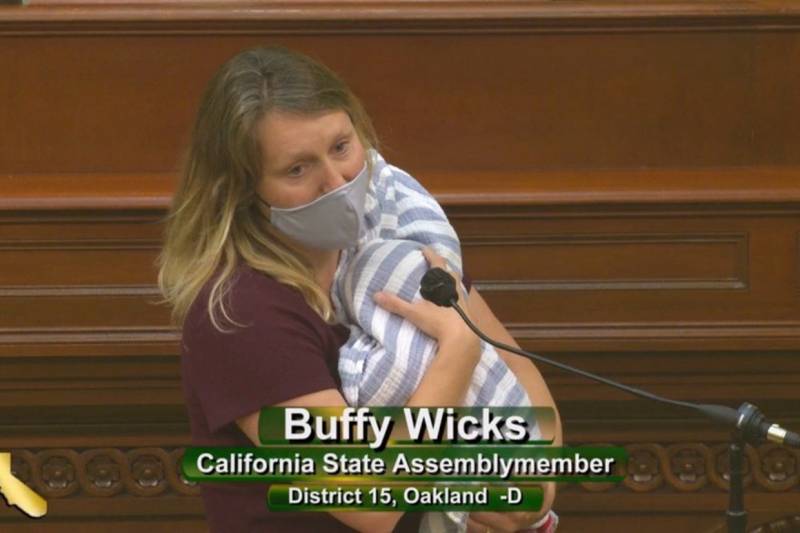Juggling a newborn is difficult. Juggling one while working is even harder. Juggling one who is hungry and crying while you're trying to speak about a critical piece of legislation is hard to fathom.
But that's the situation Assemblymember Buffy Wicks, D-Oakland, found herself in late Monday night as the California Legislature was wrapping up its session for the year. Wicks had requested the ability to vote by proxy, an option only made available because of recent COVID-19 outbreaks in the state Capitol.
At first, she thought her request would be granted. But it was ultimately denied by Assembly Speaker Anthony Rendon's office, which told Wicks maternity leave didn't qualify.
So, with her colleagues counting on her vote to push several big bills over the finish line, Wicks had a choice to make.
"Do I just stay home with my 4-week-old and continue to nurse her every two or three hours, and be a mom and continue to stay on leave?" she said this week on KQED's Political Breakdown. "Or do I schlep to the Capitol? And if I do, do I bring her with me?"
Wicks decided she needed to be in the Capitol to cast her votes — and that, as a breastfeeding mom, she needed to bring her baby with her. They spent much of the day in Wick's office, but the assemblywoman drew worldwide attention when she stopped breastfeeding and raced down to the floor, newborn in her arms, to speak in support of a contentious housing bill.
"Please, please, please pass this bill," she implored her colleagues. "I'm going to go finish feeding my daughter."
The bill ultimately failed, but Wicks' speech, complete with crying baby, went viral. It wasn't long before Rendon, the assembly speaker, issued an apology.
“I want to make a full apology to Assemblymember Wicks. My intention was never to be inconsiderate toward her, her role as a legislator, or her role as a mother," Rendon, D-Lakewood, said in a statement. "I failed to make sure our process took into account the unique needs of our members. The Assembly needs to do better. I commit to doing better.”
But Sacramento State political science professor Kim Nalder said calling Wicks' experience unique shows Rendon does not fully grasp the situation.
"(Giving birth) is not unique. It's one of the least unique things a person can do," Nalder said. "He doesn't consciously realize that he's calling it unique, as if it is some outlier, when it's something that most women end up doing sometime in their lifetime."
In fact, Rendon's wife gave birth to their daughter just last year. Nalder said society should stop acting as if having women in the workplace is a radical thing.
"It's clear in the Legislature, (and) in most workplaces, the unconscious assumption is that most workers are going to be male. And not just men, but devoid of any responsibilities for caring for other people," she said. "So it just didn't occur to them, apparently, to make an exception for someone who's recently given birth and has a newborn."
